|
|
|
Sort Order |
|
|
|
Items / Page
|
|
|
|
|
|
|
| Srl | Item |
| 1 |
ID:
111532
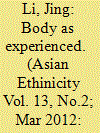

|
|
|
|
|
| Publication |
2012.
|
| Summary/Abstract |
This article looks at the filming of the Dai river bathing custom by the media professionals for tourism promotion in Xishuang Banna, China. It speaks to the previous scholarships that have studied the Otherness of ethnic minorities in China's mainstream and popular representations. Yet this case contextualizes this issue in the era of China's domestic tourism, when ethnic cultures and bodies are increasingly put on display, experienced, and (re-)produced through individualized, immediate, embodied encounters in tourist zones. By taking embodied experiences to the center, this article studies the touristic representation of ethnic minorities as China's national Others from an angle of embodiment. It inquires how the embodied experiences of both media professionals and Dai bathers at the filming constitute the very process during which Otherness, difference, and selfness are perceived, actualized, and (re-)produced in localized reality and at the grassroots level.
|
|
|
|
|
|
|
|
|
|
|
|
|
|
|
|
| 2 |
ID:
147384
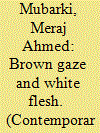

|
|
|
|
|
| Summary/Abstract |
This paper posits that the contemporary (re)configuration of the generic white woman of Hindi cinema solely as a spectacle was produced by the nationalist discourse during the colonial encounter. This essay explores both the textual analyses and aesthetic strategies employed in the construction of national imagery of white female subjectivities. My approach is twofold: (i) to chart the historical specificities of the representational construct of the white woman through discontinuous changes occurring across Bombay cinema, and (ii) to explore the white female subjectivities across specific historical and cultural milieu. This paper probes the historicity of the ‘Otherness’ of the white woman in Hindi cinema reviews and re-examines how Hindi cinema constitutes female whiteness. I posit that the representation of the white woman in Hindi cinema as promiscuous and sexually available was constructed within the nationalist discourse of the colonial era and is a continuation of the white memsahib in her absence. It is my position that all that was ‘repressed’ in the Hindu woman resurfaces in the white woman – the racial, sexual ‘Other’, onto whom everything repressed within the self could be projected.
|
|
|
|
|
|
|
|
|
|
|
|
|
|
|
|
| 3 |
ID:
114670


|
|
|
|
|
| Publication |
2012.
|
| Summary/Abstract |
This article examines Chinese nation building in the post-Cold War era
from the perspective of foreign policy. It focuses on the role of Japan and the United
States as significant "Others" in Chinese leaders' construction of three major variants
of Chinese national identity: as a victim (past), as a developing country (present) and
as a great power (future). The article argues that Japan occupies a primary place in the
enactment of the past aspect of Chinese identity, while the US plays a major role in its
present and, especially, future aspects.
|
|
|
|
|
|
|
|
|
|
|
|
|
|
|
|
| 4 |
ID:
152541


|
|
|
|
|
| Summary/Abstract |
Since taking office in November 2015, Poland’s conservative government has pressed for a sweeping reinterpretation of the past, and a re-envisioning of the future, of the political community. This conservative identity project idealises the allegedly fully sovereign Poland of the interwar period and repudiates the normative commitments underpinning Poland’s accession to the European Union. The worldview of the conservative government’s liberal critics, by contrast, represents a fusion of the inclusive nationalism asserted in opposition to communist rule with the affirmation of a European identity. The reawakening of historically resonant debates about the nature of Poland’s European-ness, emphasizing the centrality of the (Western) European ‘other’ in Poland’s national idea, carries significant implications for its relations within the international environment.
|
|
|
|
|
|
|
|
|
|
|
|
|
|
|
|
| 5 |
ID:
157740
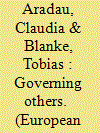

|
|
|
|
|
| Summary/Abstract |
As digital technologies and algorithmic rationalities have increasingly reconfigured security practices, critical scholars have drawn attention to their performative effects on the temporality of law, notions of rights, and understandings of subjectivity. This article proposes to explore how the ‘other’ is made knowable in massive amounts of data and how the boundary between self and other is drawn algorithmically. It argues that algorithmic security practices and Big Data technologies have transformed self/other relations. Rather than the enemy or the risky abnormal, the ‘other’ is algorithmically produced as anomaly. Although anomaly has often been used interchangeably with abnormality and pathology, a brief genealogical reading of the concept shows that it works as a supplementary term, which reconfigures the dichotomies of normality/abnormality, friend/enemy, and identity/difference. By engaging with key practices of anomaly detection by intelligence and security agencies, the article analyses the materialisation of anomalies as specific spatial ‘dots’, temporal ‘spikes’, and topological ‘nodes’. We argue that anomaly is not simply indicative of more heterogeneous modes of othering in times of Big Data, but represents a mutation in the logics of security that challenge our extant analytical and critical vocabularies.
|
|
|
|
|
|
|
|
|
|
|
|
|
|
|
|
| 6 |
ID:
114659
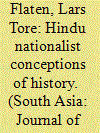

|
|
|
|
|
| Publication |
2012.
|
| Summary/Abstract |
In this article, I seek to examine some key mechanisms underlying the dichotomisation between Hindus and Muslims in Hindu nationalist history writing. Two arguments are central to this study. One is that the strict dichotomisation between Hindus and Muslims presupposes homogeneous categories. This is particularly clear if one examines how Hindu nationalist intellectuals made sense of ambiguities, of individuals and cultural traditions that did not fit directly into the categories, 'Hindus' and 'Muslims'. Moreover, I discuss the role of the so-called hidden 'Others'. I argue that these hidden 'Others' represent, in the form of alternative principles of grouping, the largest obstacle to the Hindu nationalist construction of a Hindu-Muslim dichotomy, both at the political level and within the field of history writing.
|
|
|
|
|
|
|
|
|
|
|
|
|
|
|
|
| 7 |
ID:
122651
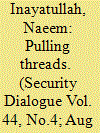

|
|
|
|
|
| Publication |
2013.
|
| Summary/Abstract |
The achievements of Elizabeth Dauphinee's (2013) The Politics of Exile are highlighted by means of two juxtapositions. First, Dauphinee's book invites a contrast to novels because it takes the form of a story. Specifically, Dauphinee's portrait of the vilified 'Serbs' is compared with how the Taliban are treated in Khalid Hosseini's The Kite Runner and Nadeem Aslam's The Wasted Vigil. Second, The Politics of Exile is examined as it emerges from Dauphinee's efforts to overcome the limits of her more academic work. The advantages of Dauphinee's approach relative to our standard research are presented along five dimensions: the responsibility of closure, the purpose of narration, the transparency of the message, how the work is shown, and the role of generosity. This article critiques Dauphinee's silence on the purpose of travel. It closes by suggesting what social theory can glean from The Politics of Exile. Social theorists can learn how to theorize more systematically, to weigh the relationship between the form and content in writing more judiciously, and to probe the deeper purposes of our intellectual life-work more fully.
|
|
|
|
|
|
|
|
|
|
|
|
|
|
|
|
| 8 |
ID:
182438
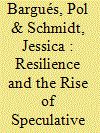

|
|
|
|
|
| Summary/Abstract |
This article explores the nature of resilience-informed international interventions today by thinking about ‘difference’. Up to the 1990s, international interventions were often characterised by a patronising tone in which backward others needed help to develop. Some 20 years later, key lessons learned were that others were so fundamentally different that efforts to assist them invariably failed. This article argues that contemporary approaches seeking to foster resilience are simultaneously propelled by both approaches. They are thus underpinned by two conflicting understandings of difference: the other that is in need and the other that cannot be attended. Even more, we contend that this contradiction is put to productive use in resilience-building: protracted crises today demand practitioners to ‘be there’, engaged permanently, to speculate, experiment, and affirm radical uncertainty. In order to analyse the novel features of resilience, we draw on Graham Harman’s speculative realism and look at policy programming of the Syrian refugee crisis.
|
|
|
|
|
|
|
|
|
|
|
|
|
|
|
|
| 9 |
ID:
151203
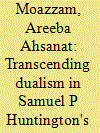

|
|
|
|
|
| Summary/Abstract |
Glorification of ‘self’ (Western civilisation) at the expense of the ‘other’ (eight civilisations) was inherent in Huntington’s Clash of Civilizations thesis. The ‘other’ civilisations identified—as the non-self and situated mostly in the Global South—were clubbed together as the Rest, irrespective of their pluralism. Building on Huntington’s binaries—the West and the Rest—this article makes an attempt to reflect on similarities within the perceived differences. Even though his civilisations appear different, they are in many ways similar due to interactions, colonisation and globalisation. Their relationship has become complicated; Western civilisation cannot do without civilisations from the Global South. Hence, there can be no perpetual or fixed enemy nor can all relationships be suspended with the ‘other’ in a globalising world.
|
|
|
|
|
|
|
|
|
|
|
|
|
|
|
|
| 10 |
ID:
126362
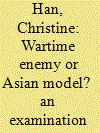

|
|
|
|
|
| Publication |
2013.
|
| Summary/Abstract |
This article compares the history curricula of Hong Kong and Singapore since the 1980s with respect to their treatment of Japan, particularly its involvement in World War II. It examines the role played by Japan as one significant "Other" against which its former victims define themselves. As well as being cast as a wartime aggressor and agent of local "victimhood," Japan has also been hailed as an economic and military model worthy of emulation. By comparing portrayals in school history textbooks and their shifts over time, the author shows how images of Japan have been used by state elites in these two former British colonies to construct significantly divergent official visions of "postcolonial" identity.
|
|
|
|
|
|
|
|
|
|
|
|
|
|
|
|
|
|
|
|
|